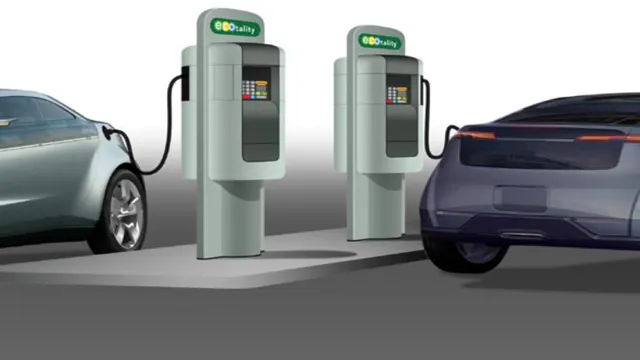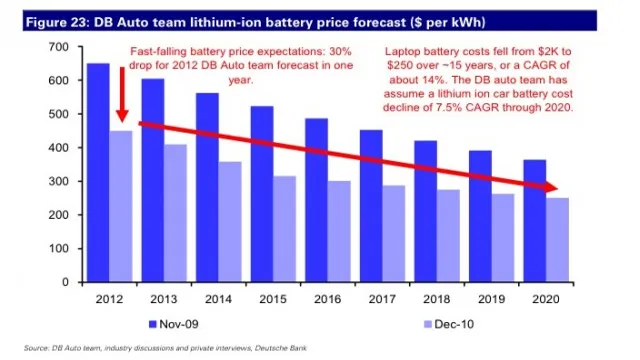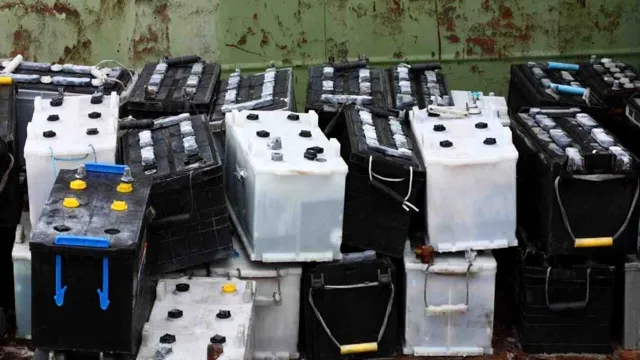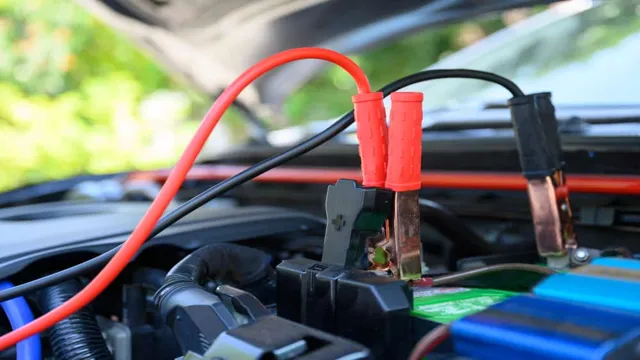Debunking the Myth: Why Electric Car Batteries Might Not Be as Green as You Think
Electric cars are often touted as the environmentally-friendly alternative to traditional gas-guzzling vehicles. However, there’s more to the story when it comes to the batteries that power these efficient vehicles. While electric car batteries provide a cleaner means of transportation compared to gasoline engines, they are not as green as you might think.
In fact, manufacturing these batteries has a significant environmental impact that’s important to consider. In this blog, we’ll explore the hidden costs of electric car batteries that you may not be aware of, and delve into whether these eco-friendly vehicles are truly the green solution they claim to be. So, buckle up and get ready to learn more about the environmental impact of electric car batteries.
Environmental Impact
While electric cars may seem like a sustainable choice for eco-conscious drivers, the truth is that their batteries aren’t entirely “green.” Electric car batteries contain a plethora of materials, including lithium, nickel, and cobalt, which are all mined from the earth. The extraction of these minerals requires significant amounts of energy which result in large carbon footprints.
Not to mention, the disposal of these batteries can be a challenge as they often contain toxic materials, which could be hazardous if not recycled properly. However, it is worth noting that electric car batteries do have less of an environmental impact than traditional fossil fuel vehicles in the long run. As technology continues to develop, electric car manufacturers are making strides towards creating more sustainable and recyclable batteries.
Additionally, by using renewable sources to power the cars, like wind and solar energy, we can further reduce our reliance on fossil fuels. While electric car batteries may not be entirely “green” yet, they are certainly a step in the right direction towards a more sustainable future.
Mining and Production Processes
Mining and production processes have a significant impact on the environment. The extraction and processing of raw materials can lead to soil erosion, deforestation, and water pollution. The use of heavy machinery and explosives can also cause air pollution and noise pollution, disrupting the local ecosystem.
Moreover, the production of certain materials such as plastics requires the use of fossil fuels, contributing to greenhouse gas emissions and climate change. It is, therefore, essential that mining and production companies implement sustainable practices that mitigate their environmental impact. This includes reducing their energy consumption, using renewable energy sources, recycling materials, and implementing proper waste management strategies.
By doing so, they can minimize their ecological footprint and contribute to a healthier planet. As consumers, we can also play our part by choosing products from companies that prioritize sustainable practices and environmental stewardship.

End-of-Life Disposal
When it comes to the end-of-life disposal of products, it’s essential to consider the environmental impact they will have. Many items end up in landfills, where they can take years or even centuries to decompose fully. As these materials break down, they release harmful greenhouse gases like methane into the atmosphere, contributing to global warming.
Additionally, products may contain toxic chemicals that can pollute the soil and nearby water sources. It’s crucial to dispose of products responsibly, either through recycling or proper waste management facilities. By doing so, we can reduce our impact on the environment and ensure that future generations can enjoy a healthy and sustainable planet.
So, next time you’re considering how to dispose of your old products, think about the environmental consequences and make a choice that benefits the Earth.
Performance and Efficiency
Electric car batteries have been touted as a green solution to the problems of climate change, but the reality is not that simple. While electric cars produce fewer emissions than traditional gas-powered cars on the road, the batteries that power them are not always as environmentally friendly as we might hope. Many of these batteries require rare metals and other materials that are mined in environmentally sensitive areas, leading to significant environmental damage.
Furthermore, the high energy requirements for manufacturing and recycling these batteries also contribute to their overall environmental cost. While electric cars are undoubtedly a step in the right direction, we need to be mindful of the costs and work to find more sustainable solutions.
Limited Charge Range
One drawback of electric vehicles (EVs) is their limited charge range. Despite advancements in battery technology, most EVs today still cannot travel far without needing to recharge. This can be particularly frustrating for drivers who are used to the convenience of petrol stations.
However, it’s important to note that charging an EV is different from refueling a petrol car. Rather than stopping for a few minutes to fill up, EVs typically require several hours to reach a full charge. As such, EV owners need to plan their journeys more carefully and be mindful of where they can charge their cars.
While this may seem like a hassle, it’s worth remembering that EVs are more energy-efficient than petrol cars, meaning they can travel further on the same amount of energy. Additionally, many people find that charging an EV at home overnight is more convenient than taking a detour to a petrol station.
Costly Battery Replacements
When it comes to electric cars, performance and efficiency are two important factors that car buyers consider. But one issue that has plagued electric cars is their costly battery replacements. While battery technology has improved over the years, replacing an electric car battery can still be very expensive.
However, it’s important to note that the lifespan of an electric car battery greatly depends on how the car is driven, charged and maintained. This means that drivers have a significant role to play in prolonging the life of their electric car battery. One thing drivers can do is to keep their electric cars charged between 20% to 80% capacity.
Charging a battery to its full capacity or letting it run low can cause damage to the battery, resulting in a shorter lifespan and the need for an expensive replacement. Additionally, it’s also crucial to stick to recommended maintenance schedules to ensure that the battery and other components of the car are working properly. By following these tips, drivers can help ensure that their electric car battery lasts as long as possible and avoid the cost of frequent replacements.
Impact on Vehicle Weight and Performance
When it comes to vehicle weight and performance, the two have a direct relationship. A heavier vehicle will generally have slower acceleration, poorer handling and braking, and lower fuel efficiency than a lighter one. The key to performance and efficiency is finding the right balance between the two.
Car manufacturers strive to reduce the weight of their vehicles through innovative materials and designs without sacrificing safety or functionality. This has led to advancements in lightweight materials such as aluminum, carbon fiber, and high-strength steel. These materials help to reduce the vehicle’s overall weight, which in turn improves performance and efficiency by creating less resistance against wind and gravity.
But it’s not just about the materials used; aerodynamics play a significant role as well. By designing a car that’s more streamlined, less energy is required to move through the air, making it more efficient. In essence, the lighter and more streamlined a vehicle is, the better it performs and the less fuel it consumes, ultimately benefiting both the wallet and the environment.
Potential Solutions
While electric cars offer a greener alternative to gasoline-powered vehicles, the production of their batteries still has an ecological impact. However, there are potential solutions to this issue. One solution is the recycling of electric car batteries.
When the batteries reach the end of their life, recycling them can recover valuable metals such as cobalt and lithium while reducing the need for further mining. Another solution is to develop more sustainable battery materials. Research is being conducted to find new materials with a lower environmental impact and improved performance.
In addition, the use of renewable energy sources such as solar, wind, and hydropower during the production of batteries is another approach to reduce the overall ecological impact of electric cars. By implementing these potential solutions, we can further reduce the environmental impact of electric car batteries and work towards a more sustainable future.
Innovations in Battery Production
The production of batteries has always been a challenging task, but the industry is making strides to find innovative solutions to improve battery performance and sustainability. One potential solution is the use of solid-state batteries, which use solid electrolytes instead of conventional liquid ones, resulting in a lower risk of overheating and a longer lifespan. Additionally, researchers are exploring the use of sustainable materials in the production process, such as recyclable metals and organic compounds.
These innovations in battery production could lead to more efficient and environmentally-friendly energy storage solutions. However, these advancements are still in the early stages of development and will require significant investment and research to become commercially viable. Nonetheless, the future of battery production looks promising, and it holds the potential to revolutionize various industries, including transportation and renewable energy.
Improving Charging Infrastructure
Improving charging infrastructure is essential for driving electric vehicle (EV) adoption and reducing carbon emissions. One potential solution is to install more charging stations across the country. For example, companies like ChargePoint and EVgo are expanding their networks by installing fast-charging stations in urban areas and along highways.
Another solution is to develop smart charging systems that optimize charging times and reduce strain on the grid. These systems can also allow for vehicle-to-grid (V2G) technology, where EVs can store excess energy and feed it back to the grid during peak demand periods. Additionally, incentives such as tax credits and rebates can encourage consumers to purchase EVs and invest in home charging infrastructure.
By implementing these solutions, we can accelerate the transition to a cleaner, greener transportation system.
Conclusion
In conclusion, while electric cars may seem like a promising step towards a greener future, the reality is that their batteries are not as green as we may think. From the mining and transportation of raw materials to the energy required to manufacture and dispose of these batteries, there are still many environmental concerns to consider. Perhaps we need to look beyond just owning an electric car and consider the bigger picture of reducing our overall energy consumption and finding more sustainable solutions.
After all, as they say, it’s not just about having a green car, it’s about living a green lifestyle.”
FAQs
How are electric car batteries harmful to the environment?
Despite being a more environmentally-friendly alternative to gas-powered cars, the production and disposal of electric car batteries can have negative impacts on the environment. The mining of materials for batteries, such as lithium, can lead to habitat destruction and water pollution. When batteries are no longer useful, they can create electronic waste that is difficult to recycle and can release toxic chemicals into the environment.
Are there any alternatives to traditional electric car batteries?
Yes, there are several alternatives currently being researched and developed. Some potential options include solid-state batteries, which use solid electrolytes instead of liquid ones, and flow batteries, which store energy in liquids that flow through the system. There is also research being done into using graphene and other materials to improve battery efficiency.
Can electric car batteries be recycled?
Yes, most electric car batteries can be recycled to some extent. However, the process can be difficult and expensive. Currently, only a small percentage of electric car batteries are recycled, but as the technology becomes more widely used, there will likely be a greater demand for more efficient recycling methods.
What can consumers do to minimize the environmental impact of electric car batteries?
Consumers can take steps to maximize the lifespan of their electric car batteries, which in turn reduces the need for frequent replacements. This includes regular maintenance and avoiding charging the battery to full capacity too often. When it comes time to replace a battery, consumers can look for environmentally-friendly disposal options and consider purchasing batteries that are made with recycled materials.





